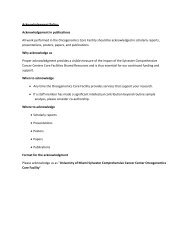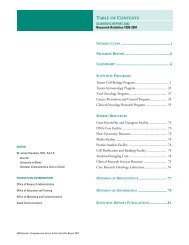SCIENTIFIC REPORT 2004 - Sylvester Comprehensive Cancer Center
SCIENTIFIC REPORT 2004 - Sylvester Comprehensive Cancer Center
SCIENTIFIC REPORT 2004 - Sylvester Comprehensive Cancer Center
You also want an ePaper? Increase the reach of your titles
YUMPU automatically turns print PDFs into web optimized ePapers that Google loves.
T U M O R I M M U N O L O G Y P R O G R A M<br />
SELECTED PUBLICATIONS<br />
2002<br />
Tolba, KA, Bowers, WJ, Eling, DJ, Casey, AE,<br />
Kipps, TJ, Federoff, HJ, and Rosenblatt, JD.<br />
Herpes simplex virus (HSV)-amplicon-mediated<br />
delivery of LIGHT enhances the antigen-presenting<br />
capacity of chronic lymphocytic leukemia.<br />
Molecular Therapy 6:455-63, 2002.<br />
Tolba, KA, Bowers, WJ, Muller, J, Housekneckt,<br />
V, Giuliano, RE, Federoff, HJ, and Rosenblatt,<br />
JD. Herpes simplex virus (HSV) amplicon-mediated<br />
codelivery of secondary lymphoid tissue<br />
chemokine and CD40L results in augmented antitumor<br />
activity. <strong>Cancer</strong> Research 62:6545-51,<br />
2002.<br />
Rosenblatt, JD, Shin, SU, Nechustan, H, Yi,<br />
KH, and Tolba, K. Potential role of chemokines<br />
in immune therapy of cancer. Israel Medical<br />
Association Journal 4:1054-59, 2002.<br />
MARTA TORROELLA-KOURI, PH.D.<br />
Assistant Professor of Microbiology<br />
and Immunology<br />
DESCRIPTION OF RESEARCH<br />
When tumor cells initially emerge in a<br />
healthy organism, they are recognized by<br />
the immune system. This recognition leads to an<br />
incipient defense reaction and elimination of the<br />
initial tumor cell population. For unknown reasons,<br />
however, some tumors progress, infiltrate,<br />
and eventually metastasize and kill the host. Before<br />
this occurs, a progressive decline in the immune<br />
response of the host is observed. Today,<br />
researchers know that the tumor is directly responsible<br />
for this immunodepression observed in<br />
tumor-bearing organisms.<br />
The study of the interplay between a tumor<br />
and its host, in terms of the mechanisms displayed<br />
by the tumor that eventually control and<br />
diminish the otherwise healthy immune response<br />
of the host organism, is the center of Dr.<br />
Torroella-Kouri’s research. She is particularly interested<br />
in the role of the innate immune response<br />
in cancer. Researchers in her laboratory<br />
work with a mouse mammary tumor model in<br />
which they observe a profound decrease in the<br />
immune response of tumor-bearing animals. Specifically,<br />
and among many other events, a deregulation<br />
in the production of cytokines, important<br />
mediators in cell-to-cell communication, is observed.<br />
One of them, the critical cytokine<br />
interleukin-12 (IL-12), produced by macrophages<br />
and dendritic cells (DC), is seriously decreased in<br />
the diseased animals. IL-12 has not only been<br />
shown to play a central role in the communication<br />
between the innate and induced immune<br />
responses, but also recently has been the center of<br />
much clinical interest due to its recognized antitumor<br />
properties.<br />
The laboratory has shown that several mammary<br />
tumor-derived factors appear to be responsible<br />
for the decreased production of IL-12 in the<br />
tumor host. Their present research focuses particularly<br />
in elucidating the mechanisms through<br />
which the tumor-derived phospholipid phosphatidylserine,<br />
as well as the cytokine IL-6, overproduced<br />
in tumor-bearing animals, are able to<br />
impair IL-12 expression in tumor animals. The<br />
understanding of the molecular mechanisms governing<br />
the expression of the critical cytokine IL-<br />
12 in the context of the interaction between a<br />
tumor and the immune system is essential in efforts<br />
aimed at designing therapeutic strategies to<br />
treat malignant disorders. Given its many roles,<br />
direct applications of IL-12 or modulation of IL-<br />
12 levels will remain an important aspect of research<br />
for the treatment of cancer. The<br />
laboratory’s tumor system, which like in the human<br />
situation presents a severe impairment of IL-<br />
12 production, is an excellent model in which to<br />
design future translational research.<br />
UM/<strong>Sylvester</strong> <strong>Comprehensive</strong> <strong>Cancer</strong> <strong>Center</strong> Scientific Report <strong>2004</strong> 125
















